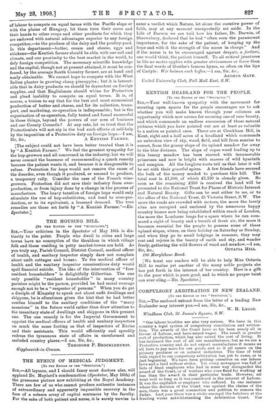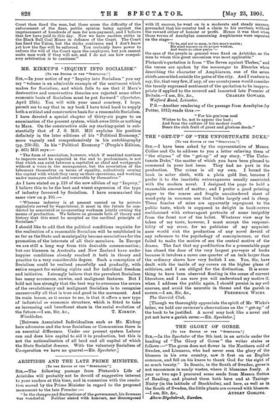COMPULSORY ARBITRATION IN NEW ZEALAND. [TO TEE EDITOR OF THE
" SPECTATOR.'•A
W. H. LEGGE.
Windham Club, St. James's Square, S. W.
" Our labour troubles are also very serious. We have in this country a legal system of compulsory conciliation and arbitra- tion. The awards of the Court have so far been nearly all in favour of Labour, and have raised wages. The result is greater cost of production, which has also raised the cost of living. It has increased the cost of all our manufactures, but as we are a Protective country and do not export manufactures it means we all have to pay more for our goods, and so it all comes on the primary producer or on natural industries. The time of trial with regard to our compulsory arbitration has yet to come, or is just beginning. We have been priding ourselves on our labour laws and a land without strikes. Yet every newspaper was full of lists of fined employers who had in some way disregarded the award of the Court, or of workers who were fined for working at less than the award in their particular trade. However, all went well so long as it was considered in the interest of Labour. It was the capitalist or employer who suffered. In one instance where the decision of the Court was against the claims of the men, there was a great commotion and petition to remove the Judge. Last year there was a strike amongst the butchers at the freezing works notwithstanding the Arbitration Court. The
Court then fined the men, but there arose the difficulty of the enforcement of the fines, public opinion being against the imprisonment of hundreds of men for non-payment, and I believe that few have paid to this day. Now we have another strike in the Black Ball Coal Mines in defiance of the Court. The Court has fined the Union, but the strike continues and I don't know yet how the fine will be enforced. You certainly have power to enforce the will of the Court upon the employers, but you cannot make men work if they will not, and I do not see how compul- sory arbitration is to continue."







































 Previous page
Previous page